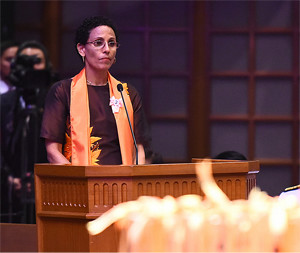Statement by Ms. Roberta Clarke, Regional Director UN Women Regional Office for Asia and the Pacific
On the Occasion of the International Day for the Elimination of Violence against Women and the 16 Days of Activism against Gender-based ViolenceDate:

Your Royal Highness Princess Bajrakitiyabha
Your Excellency Police General Adul Sangsingkeo, Minister for Social Development and Human Security of the Royal Thai Government,
Ambassadors,
Distinguished Guests,
We are especially honored to have Her Royal Highness, the Princess, to preside over this commemoration. We are grateful for her support as UN Women’s Goodwill Ambassador.
Today we join the global observance of the International Day to End Violence against Women and the commencement of the 16 Days of Activism. This is a campaign that demands from us all a commitment to be agents of change, to be champions for gender equality, justice and peace.
This we know to be true: there is no human rights violation more tolerated than violence against women and girls. And because of this, no human rights violation is more pervasive, more universal, and more damaging to women, societies, communities and families.
Violence against women is an expression of power and control used in times of ‘peace’ and in times of conflict. It is both a cause and consequence of sex discrimination.
But on this International Day, there is much to encourage us. Like at no other time, states have committed to action and have accepted accountability for eliminating violence against women.
At the Global Leaders’ Meeting on Gender Equality and Women’s Empowerment this past September, attended by over 80 leaders of member states, the majority named ending violence against women and girls as a top priority. Heads of state from 19 Asia and the Pacific countries pledged to increase frontline services and counselling for survivors, committed to diligent enforcement of laws, the dismissal of outdated mentalities and customs and ending child marriage.
Five years ago, when the UN Secretary General launched the UNiTE to End Violence against Women campaign, he recognized that the agenda was a complex one, requiring resolve and coordinated actions from a range of partnerships to counteract entrenched structural inequalities. And more and more, we are seeing commitments to prevention, justice and the extension of services, for example, in ASEAN’s 2nd Declaration to End Violence against Women and Children.
Because a law is only as good as its implementation, work is focused on the administration of justice, as is the case in Thailand, where there is ongoing capacity development of police and prosecutors to combat impunity and to ensure women’s access to justice.
Countries accept that comprehensive National Action Plans need to be well resourced for effective implementation. Costing studies around the region are helping countries assess resource requirements for implementing multi-sectoral policy commitments, necessary for closing the gap between policy and practice.
And there is many actions being taken through partnerships with women’s organizations, governments, private sector companies, faith-based institutions and individuals.
- In Afghanistan and Pakistan, dedicated, women-run facilities provide survivors of violence with protection, legal aid, health care, counselling and referral services.
- In Lao PDR, a new curriculum for secondary schools has enhanced the skills of both teachers and students to prevent violence and promote gender equality amongst young people.
- In Fiji, young male street dwellers have been engaged as “behaviour change champions” to increase the protection of women and girls on the streets and in markets - In Papua New Guinea over 5,000 people in remote communities across the country were reached by community theatre performances on harmful gender norms.
- In China, pre-deployment training for peacekeepers stresses gender-sensitivity and skills to better protect civilian populations in conflict areas.
- And across ASEAN, judges are confronting harmful gender stereotypes that impede women’s access to justice.
But there is so much more that must be done. And as we launch the 16 Days of Activism, this Orange the World initiative, the brainchild of the UNITE youth network, reminds us of our moral obligations to speak up and speak out.
Tomorrow we will see the images of oranged landmarks, from the National Monument of Pakistan to India Gate, from Christ the Redeemer statue in Rio to the Australian Embassy and Central World right here in Bangkok. These images, these lights, are beacons for all of us to work together, consistently and insistently, in solidarity to defend women’s human rights to live free from violence and discrimination.
We must all have zero tolerance for violence against women and girls and work in partnership and with urgency to accelerate the achievement of gender equality and more a just and peaceful world. If we UNiTE and work together, we can reach a Planet 50-50 by 2030.